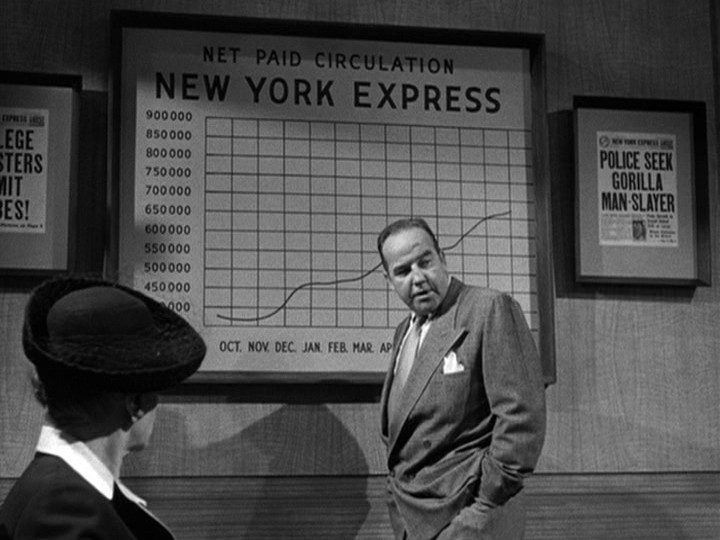
The directors whose work I have praised repeatedly on this site are all household names except for Phil Karlson. He rarely got decent budgets and spent much of his career at studios and in positions that weren’t worthy of his talent. Yet he managed over the years to make some highly compelling movies that conveyed his bleak and brutal perspective on the human condition. I have recommended two of his collaborations with producer Edward Small that starred John Payne Kansas City Confidential and 99 River Street. Let me add to those a recommendation of another Karlson-Small collaboration, this one with a bigger budget and a bigger star than the director usually had to hand: The 1952 noir Scandal Sheet.
The plot: Circulation at the New York Express has been soaring since an editor named Mark Chapman (or is he???) converted it into a tabloid full of sensationalist stories, ruffling the feathers of the bluenoses on the board as well as idealistic features writer Julie Allison (Donna Reed). Said editor (Broderick Crawford) is aided in his work by ace newshound Steve McCleary (John Derek), who digs up dirt for his mentor while failing to successfully romance June. But Chapman’s world is upended when a woman from his past re-appears, and he embarks on a series of desperate, violent, actions that McCleary begins to investigate. Noirish themes of moral compromise and inevitable doom ensue.

This film echoes the summit of Crawford’s career, namely the 1949 Best Picture winner All The King’s Men. Again Crawford effectively portrays a domineering yet vulnerable man and again he has a father-son style relationship with a character played by John Derek, although in this case Derek is his mentee rather than literally his son, and the relationship is much warmer. Indeed, the art in Crawford’s performance is how he simultaneously conveys his rising panic that his secrets could come out and his admiration and pride that his protégé is so effectively hunting him down. The other echo of ATKM is the magnificent Burnett Guffey’s cinematography, which combines the look of urban realism (despite this being filmed on the Columbia back lot and using some stock shots of New York City) with a dash of film noir-style camerawork. The opening shot of this movie, as the camera moves over a cluster of fire escapes filled with onlookers and a murder witness, is a clinic by Karlson and Guffey on how to pull an audience in the particular world of a movie right from the first.
John Derek was irresistible to women, but was not a particularly good actor. The quality supporting work here comes instead from Reed, who shows she could do more than be the wholesome All-American mom who serves milk and cookies. Henry O’Neil is also affecting as an unemployed, alcoholic, Pulitzer Prize winning journalist looking for a way back.
Karlson’s serves up a bracing dose of cynicism leavened with glimmers of hope, and manages to maintain tension throughout the story despite the fact that under the conventions of noir, the ending is never really in doubt. The only person who didn’t like Karlson’s adaptation of the 1944 novel The Dark Page was Samuel Fuller, who wrote it. Perhaps it was just vanity that made Fuller resent anyone other than himself adapting his own work, but movie fans were the winner because it inspired him to start making his own films, including classics like Pickup on South Street (my recommendation here).
p.s. Sadly, Crawford’s alcohol addiction kept him from building on his cinematic successes of the late 1940s and early 1950s. But he did have a late-career revival on television, including starring on Highway Patrol and, bizarrely enough, hosting an early episode of Saturday Night Live.
